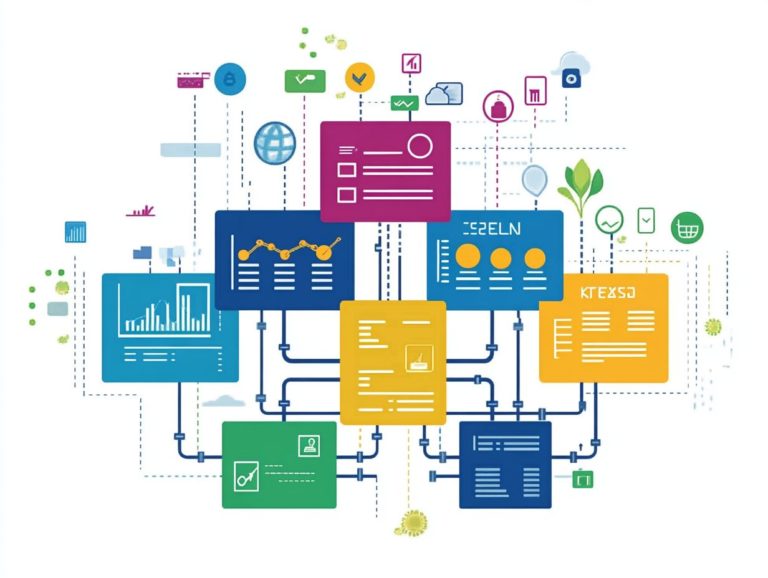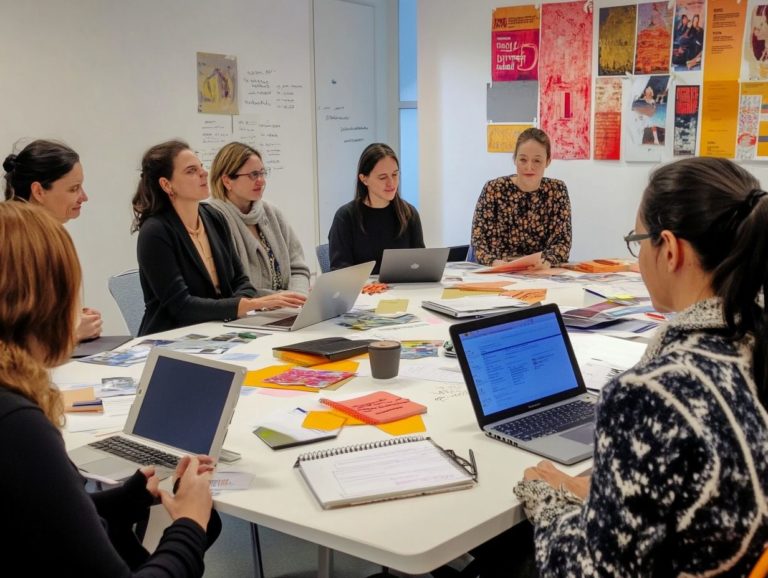5 Ways to Enhance Your PM Certification Experience
Embarking on the journey to project management certification can feel like a thrilling adventure. Yet, it may also present its fair share of challenges. Whether you re just beginning or aiming to refine your skills, establishing clear goals and leveraging available resources are essential steps on your path.
You’ll uncover practical strategies to enhance your certification experience, from joining study groups to utilizing sample exams. Consider how networking and effective time management can be pivotal in achieving your success.
Get ready to unlock exciting career opportunities! Dive in for insights that could transform your certification journey.
Contents
- Key Takeaways:
- 1. Set Clear Goals and Objectives for Your Certification
- 2. Take Advantage of Study Materials and Resources
- 3. Join Study Groups or Online Communities
- 4. Practice with Sample Exams and Simulations
- 5. Seek Feedback and Guidance from Experienced Project Managers
- How Can a PM Certification Benefit Your Career?
- Frequently Asked Questions
- What are the benefits of enhancing my PM certification experience?
- What are 5 ways to enhance my PM certification experience?
- How can networking benefit my PM certification experience?
- Do I need to take additional courses or workshops?
- How can I stay updated with industry trends?
- What are some ways to continuously improve my skills?
Key Takeaways:

Set clear goals and objectives for your certification to stay focused and motivated throughout the process. Take advantage of study materials and resources, such as study guides, practice exams, and online courses, to enhance your understanding of project management concepts. For more targeted tips, check out this advice for new project managers seeking certification. Join study groups or online communities to connect with other aspiring project managers and learn from their experiences and perspectives.
1. Set Clear Goals and Objectives for Your Certification
Setting clear goals and objectives for your certification is essential. It guides your study process and ensures you focus on areas that enhance your skills.
By using the SMART method, you can create goals that are:
- Specific pinpointing exactly which certification to pursue,
- Measurable defining how you’ll track your progress,
- Achievable setting realistic learning targets,
- Relevant aligning your objectives with your career aspirations,
- Time-bound establishing deadlines for completion.
This thoughtful approach to goal-setting clarifies your focus during preparation. It aligns your certification journey with your broader career ambitions.
Such competencies include effective communication, risk management, and leadership abilities. These skills are fundamental for navigating complex projects and driving teams toward shared outcomes.
2. Take Advantage of Study Materials and Resources
Utilizing a diverse range of study materials and resources is essential for effective preparation for the PMP exam. This approach enhances your project management training experience and ensures you thoroughly grasp key concepts.
By broadening your understanding, you cater to different learning styles. Whether you prefer the structured format of textbooks, the flexibility of online courses, or the visual assistance offered by video tutorials, there s something for everyone.
Selecting high-quality study materials is pivotal. They should comprehensively cover best practices, frameworks, and tools relevant to the PMP certification. Integrating these various resources reinforces your knowledge and develops a holistic view of project management, ultimately boosting your chances of success in the exam.
3. Join Study Groups or Online Communities
Joining study groups or online communities can significantly elevate your learning experience. These platforms offer invaluable networking opportunities and foster collaboration among professionals who share your certification goals.
They provide a space for you to exchange resources and study materials while facilitating engaging discussions about complex topics. Tackling these subjects with a group allows you to gain diverse perspectives and insights, enriching and streamlining your learning process.
The support and motivation from peers create accountability, encouraging you to maintain consistent study habits.
Platforms like LinkedIn, Slack, and specialized forums, such as ProjectManagement.com, are excellent avenues for connecting with like-minded individuals on the path to various project management certifications.
By tapping into these communities, you can enhance your knowledge and confidence as you pursue your goals.
4. Practice with Sample Exams and Simulations

Practicing with sample exams and simulations is an essential step in your preparation for the PMP exam. It allows you to build important project management skills and hone your task management abilities in a timed setting.
By familiarizing yourself with the exam format and the variety of questions, you not only boost your confidence but also enhance your capacity to navigate unexpected challenges during the actual test.
Comprehensive resources think online practice exams, study guides, and interactive quizzes are invaluable in this journey. Engaging in timed simulations fortifies your time management skills, teaching you how to allocate your time wisely across different sections.
This can greatly boost your performance, ensuring that you re ready to excel on exam day.
5. Seek Feedback and Guidance from Experienced Project Managers
Seeking feedback and guidance from seasoned project managers can elevate your grasp of project management principles. It offers insights that are crucial for your career advancement and professional development.
Network and join mentoring programs to make valuable industry connections. These interactions often lead to enlightening discussions that broaden your perspective and reveal new methodologies or tools that can enhance your effectiveness.
When you reach out, it s essential to craft specific questions and pinpoint key areas of focus. Targeted inquiries can yield more actionable feedback, sharpening your understanding and helping you build deep, trusting relationships in the field.
This can greatly boost your career.
How Can a PM Certification Benefit Your Career?
Ready to skyrocket your career? A project management certification can make all the difference! A project management certification can significantly elevate your career, enhancing your earning potential, unlocking new opportunities, and positioning you as a standout professional in the project economy. This makes you a highly attractive choice for both employers and clients.
As a certified project manager, you may find yourself eligible for advanced roles, such as program manager, portfolio manager, or even executive positions within organizations. Statistics show that certified professionals can earn up to 20% more than their non-certified peers, a difference that can greatly impact your long-term financial stability and career progression.
For instance, a project manager with a PMP certification can command an average salary around $120,000, while those without certification typically hover around $95,000. This salary disparity highlights the enduring value of certification, not only in terms of skill recognition but also in boosting your competitiveness in today s ever-evolving job market.
- Increased salary potential.
- Access to new job opportunities.
- Career advancement potential.
What Are the Different Types of PM Certifications Available?
There are a variety of project management certifications available, each tailored to different experience levels and areas of specialization, with the PMP certification standing out as one of the most recognized and respected credentials in the field.
If you’re just starting your career, the CAPM certification is ideal, focusing on foundational project management principles.
On the other hand, PRINCE2 offers a structured approach and is particularly favored in the UK and Europe, appealing to individuals across various industries who appreciate a clear methodology.
For those navigating dynamic environments, Agile certifications are a perfect fit, promoting iterative and adaptive techniques for rapidly evolving projects.
Each of these credentials comes with its own set of requirements:
- CAPM typically requires a high school diploma and some introductory project management education.
- PRINCE2 necessitates completing a training course to qualify for the exam.
- Agile certifications often demand practical experience or prior certifications.
Cost can vary significantly from a few hundred dollars for CAPM to over a thousand for specialized Agile programs. Choosing the right certification right now can open doors to exciting career opportunities!
What Are the Common Challenges Faced During PM Certification?

Navigating the journey to your project management certification presents many challenges. You may struggle with complex concepts while balancing study time with work commitments, but learning how to maximize your educational certification experience can make the process smoother.
These hurdles can quickly become overwhelming, leading to frustration and burnout. Time management is a significant issue, as you may find it challenging to carve out enough hours for both professional responsibilities and certification studies.
Develop a structured study schedule that designates specific times for learning and review while accommodating your work deadlines. Mastering project management frameworks can feel daunting, but using effective resources like online courses or study groups can greatly enhance your understanding.
Seek guidance from peers or mentors. Their insights can be invaluable, making your journey more manageable and less isolating.
How Can Time Management Help with PM Certification?
Effective time management is essential for your journey to project management certification. By allocating sufficient time for study, practice, and review, you ensure that you re well-prepared for the exam.
Consider employing techniques that prioritize your study tasks based on urgency and importance. This approach helps you focus on areas needing immediate attention.
Use planners or digital tools to create a clear study schedule. This way, you ll stay organized and on track!
Setting daily or weekly goals can significantly enhance your motivation and progress. Celebrate small victories along the way to foster a consistent study routine.
What Are the Key Skills and Knowledge Required for PM Certification?
To achieve project management certification, cultivate key skills and knowledge. This includes a solid grasp of project management principles, exceptional communication abilities, and the organizational finesse to manage multiple projects seamlessly.
Beyond these technical skills, the Project Management Body of Knowledge (PMBOK) guide highlights the significance of soft skills, like communication and teamwork, which help you work effectively with others.
Understanding various leadership styles and refining your negotiation tactics can greatly enhance your effectiveness in driving projects to successful completions. Enroll in project management courses for invaluable insights and real-world scenarios.
Online resources and workshops can further enhance your skills, equipping you with tools necessary to excel in the evolving landscape of project management.
How Can Networking Help with PM Certification?
Networking can elevate your chances of success in project management certification. It connects you with professionals who offer invaluable insights and support throughout your journey.
Engaging in meaningful interactions at industry events often leads to connections beyond superficial acquaintances. Attend seminars, workshops, and conferences to acquire up-to-date knowledge and cultivate relationships with peers and mentors.
Joining professional organizations, such as the Project Management Institute, can broaden your network and grant you access to exclusive resources and webinars.
Using social media platforms like LinkedIn is essential; these spaces foster ongoing conversations and collaboration within the project management community.
These strategies create a robust network that provides a solid foundation for career advancement and a wealth of shared knowledge.
Frequently Asked Questions

What are the benefits of enhancing my PM certification experience?
Enhancing your PM certification experience can improve your project management skills. Understanding what to expect from your PM certification training can also boost your credibility and lead to better job opportunities and higher salaries.
What are 5 ways to enhance my PM certification experience?
You can enhance your PM certification by networking with other professionals. Additionally, consider how to maintain your project management certification through taking additional courses, gaining hands-on experience, staying updated with trends, and continuously learning.
How can networking benefit my PM certification experience?
Networking offers valuable insights and helps build connections. It can open new doors for growth in your career.
Do I need to take additional courses or workshops?
While it s not required, additional courses can greatly enhance your experience. They provide new knowledge and skills not covered in your initial training.
How can I stay updated with industry trends?
Stay informed by attending conferences and webinars. Reading industry publications and joining professional organizations will also keep you in the loop.
What are some ways to continuously improve my skills?
Seek feedback from mentors and reflect on past projects. Participating in ongoing training opportunities will help you grow continuously.






